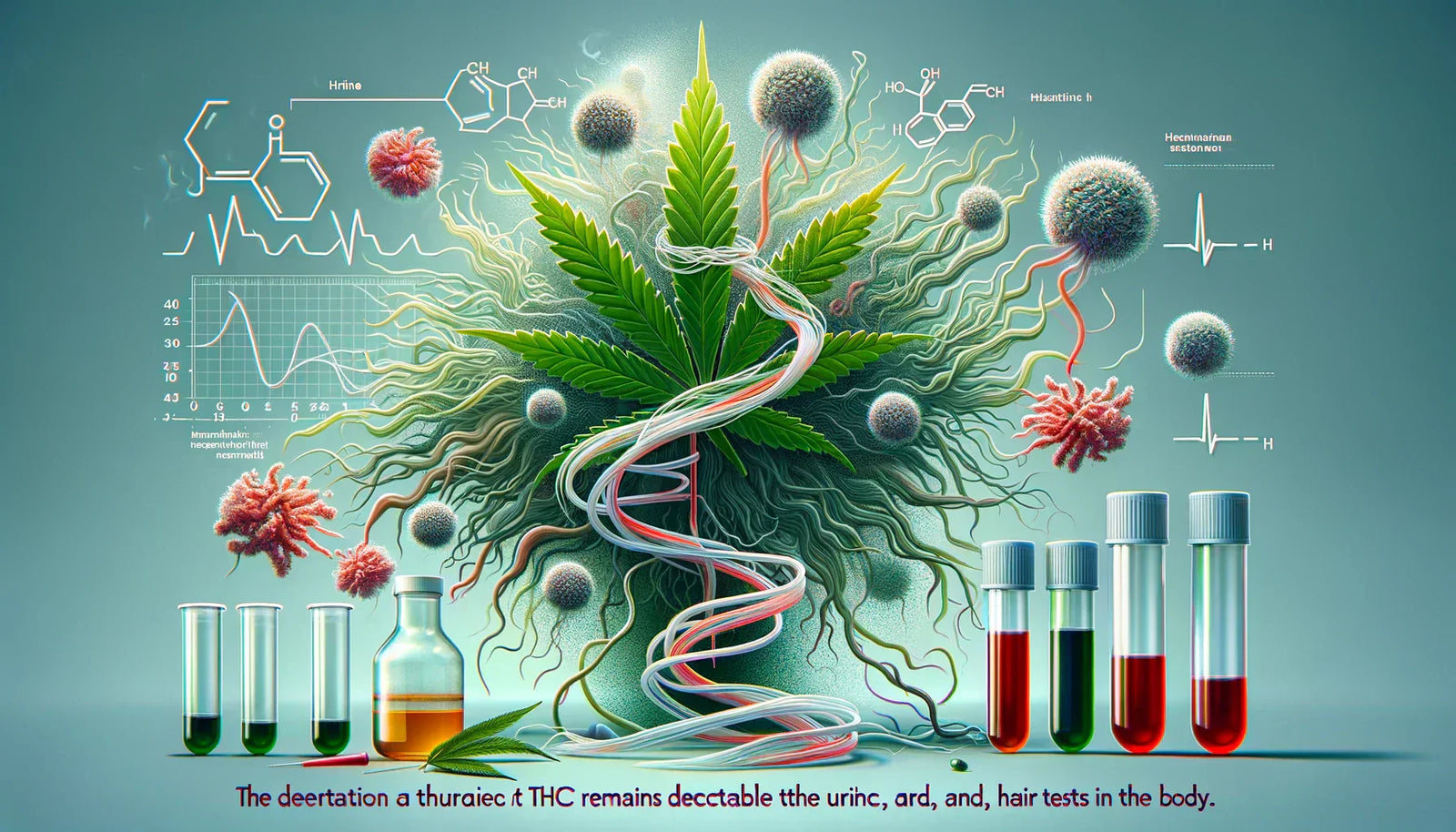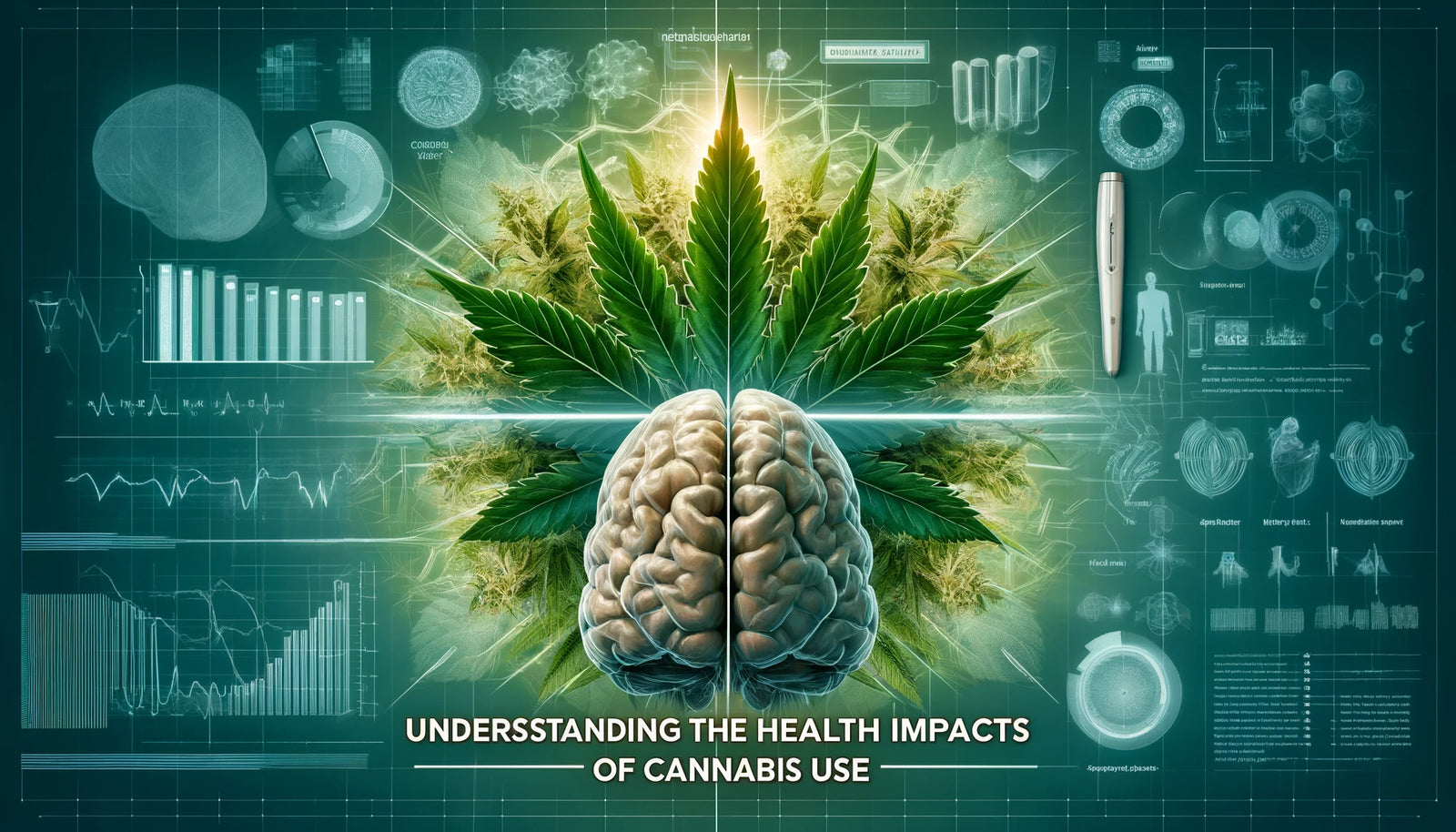Your Cart is Empty
Shop
Effects of Cannabis on the Body | Detecting THC
April 14, 2024 5 min read

Effects ofCannabis on the Body
The pivotal inquiry for those who partake in cannabis is often, "how long doesweed stay in yoursystem?" This question is not only relevant due to the psychoactive nature of cannabis but also because of the legal and medical implications associated with its use. The compound at the heart of this query is tetrahydrocannabinol (THC), the primary intoxicating element found in cannabis. When consumed, THC binds to cannabinoid receptors in the brain, initiating a cascade of neurological effects that manifest as the quintessential 'high.'
The scope of cannabis’s influence on the body extends from immediate psychoactive effects to long-term physiological implications. The short-term impact can range from a pleasurable sense of relaxation and well-being to heightened senses and increased appetite. Yet, the lingering presence ofcannabis metabolites in the system raises practical concerns about drug testing, employment, and legal matters.
How long does weed stay in your system?
The lingering question for both casual and regular cannabis users is how long the traces of their last encounter with marijuana will remain detectable within their system. The answer isn't straightforward due to the individualized nature of our bodies' interaction with THC. Generally, THC is detectable in the body from several days to a few weeks after use, but this window can vary greatly.
THC is fat-soluble, which means it integrates into our fat cells, releasing slowly over time into the bloodstream. Several factors contribute to the duration of its stay, such as:
-
Dosage and Potency: Higher doses and more potent strains of cannabis introduce more THC into the system, which subsequently takes longer to metabolize.
-
Frequency of Use: Regular users may find that THC persists in their system for a longer period due to the cumulative effect.
-
Metabolism and Lifestyle: A person's metabolic rate and lifestyle choices, like exercise and diet, influence how quickly THC is broken down and eliminated.
-
Biological Sex: Due to differences in body composition, THC may reside longer in the systems of individuals with higher body fat percentages.
For one-time users, THC might be detectable inurine for up to 3 days, while those who consume more frequently can expect a much longer detection window, ranging anywhere from a week to a month, or even longer for heavy users.
How long does weed stay in urine?
When it comes to urinetests, which are the most common form of drug testing, the detection windows can vary:
-
Occasional Users: 1-3 days
-
Moderate Users: 7-21 days
-
Chronic Users: 30 days or more
-
Chronic Heavy Users: Some cases have reported detectability up to 77 days post-use.
How long does cannabis stay in your blood?
Bloodtests for cannabis are less common but can detect THC for a shorter duration compared to urinetests. Typically, THC is detectable in the blood for 1-2 days. However, in the case of regular users, the detection window might extend up to a week.
How long can cannabis be measured in hair?
Hairtests have the most extended detection window, able to trace cannabis use back as far as 90 days. THCmetabolites enter the hair follicles through small blood vessels, and traces can remain in the hair as it grows out.
How long does a weed high last?
The duration of a cannabis high is as variable as the strains available. Typically, the euphoric effects of smoking or vaporizing cannabis can be felt almost immediately and tend to peak within the first 30 minutes, lasting between 2 to 3 hours. Edibles, on the other hand, take longer to kick in, anywhere from 30 minutes to 2 hours, but the effects can last much longer, often lingering for 4 to 6 hours, sometimes extending to 8 hours or more.
The longevity of the high depends on:
-
THC Concentration: The higher the level of THC, the longer and more intense the high.
-
Consumption Method: Smoking and vaping provide a quicker onset but a shorter duration, whereas edibles take longer to metabolize, resulting in a prolonged effect.
-
Individual Tolerance: Frequent users may experience shorter-lasting effects due to increased tolerance.
Can you overdose on weed?
The term 'overdose' implies a level of toxicity that cannabis, in its natural form, does not typically achieve. It is exceptionally rare for a cannabis overdose to be fatal. However, consuming large amounts can lead to uncomfortable symptoms such as paranoia, anxiety, panic attacks, and high blood pressure. It is important to understand one's limits and consume responsibly.
Cannabis Side Effects
While cannabis is celebrated for its potential benefits, it is not without side effects. Some common adverse effects include:
-
Dry mouth
-
Red eyes
-
Impaired motor skills and reaction time
-
Short-term memory disruptions
-
Increased heart rate
Long-term or heavy use of cannabis can lead to more severe side effects, such as:
-
Dependency or addiction
-
Cognitive impairment
-
Altered brain development in adolescents
-
Mental health issues such as anxiety or psychosis
How to sober up from weed
If you find the effects ofcannabis too intense, the following may help mitigate the high:
-
Hydration: Drink plenty of water to help flush your system.
-
Food: Eating can help diminish the effects.
-
Rest: Sleeping can allow your body to metabolize the THC.
-
CBD: Some evidence suggests that CBD can counteract the effects of THC.
How to get higher
For those seeking to intensify their cannabis experience, consider the following:
-
Consume products with higher THC levels.
-
Try different methods of consumption, like dabs or edibles.
-
Enhance the setting to contribute to a more profound experience.
However, it's essential to prioritize safety and understand the legalities and health implications associated with increased THC consumption.
In regions where cannabis is legal, such as Spain, Cannabis Social Clubs (CSCs) offer a controlled environment to explore different strains and consumption methods. Planning a trip to Barcelona? Check out the top social clubs in Barcelona with El Capitan’s Fast-Track Intro service.
Conclusion
Navigating the complexities of cannabis consumption inevitably leads back to the central concern: how long doesweed stay in yoursystem? This essential question underscores the importance of understanding cannabis and its myriad effects on the human body. It is a query that reflects both the transient nature of the substance's immediate impact and the enduring presence it can have long after the high has faded.
In our comprehensive exploration, we've delved into the factors that influence THC retention, from the method of ingestion to personal metabolism and the frequency of use. We've also touched on the broader implications of cannabis consumption, including its potential side effects and the ways to both intensify and mitigate its impact. As cannabis continues to weave its way through the cultural and legal fabric of society, the answer to this question becomes increasingly pertinent. You can explore more information on this matter, in our THC & CBD Guide that delves with more detail into the chemical composition and effects of cannabis on the body.
By recognizing the diverse variables at play, consumers can approach cannabis use with a balanced perspective, aiming for enjoyment while mitigating risks. Ultimately, by respecting the nuances of how longweed stays in our systems, we pave the way for informed choices and responsible use in an era where cannabis is no longer the mystery it once was but a familiar guest in the annals of modern pharmacology.
Leave a comment
Comments will be approved before showing up.
Also in The Captain's Blog

How To Grow Cannabis
March 16, 2025 8 min read
Discover the ultimate guide to growing indoor cannabis with El Capitan! This comprehensive 8-minute read offers expert tips, step-by-step instructions, and pro techniques to cultivate high-quality cannabis at home. Perfect for beginners and seasoned growers alike—start your grow journey today!

The Future of Cannabis Legalization in Europe
April 14, 2024 11 min read
Explore the future of cannabis legalization in Europe in this informative blog post. Our expert analysis covers the economic benefits, regulatory framework, and social implications of cannabis legalization, as well as the current state of cannabis laws in Europe. With detailed statistics and real-world examples, this post provides valuable insights for anyone interested in the future of cannabis in Europe.
Read More
The Negative Health Effects of Cannabis
April 14, 2024 2 min read
This article provides an in-depth look at the multifaceted health effects of cannabis, covering everything from psychological and neurobiological impacts to dependency, addiction, and its influence on respiratory and cardiovascular health. With insights into the latest studies and expert opinions, understand the complexities surrounding the use of cannabis and its implications on human health.
Read More❗El Capitan does not promote or encourage cannabis consumption.❗
Subscribe
Sign up to get the latest on sales, new releases and more …






